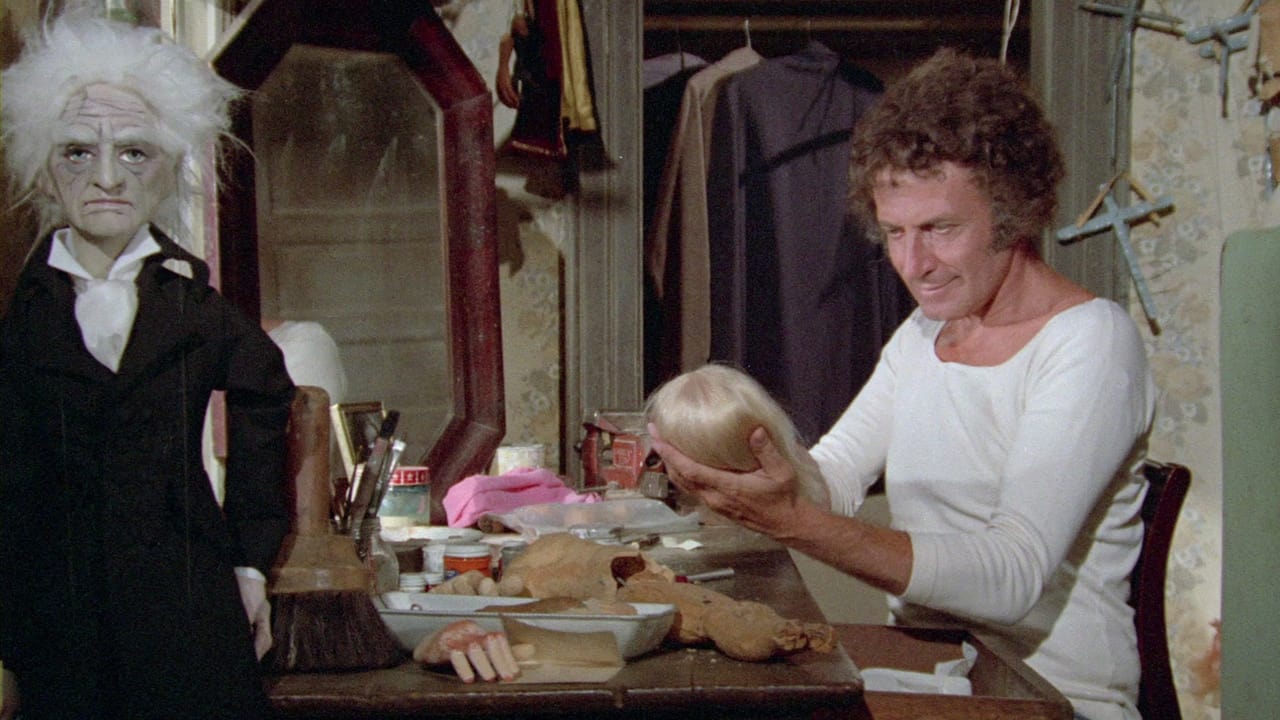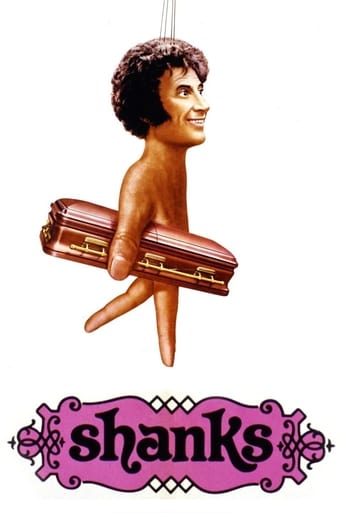

Schlock master William Castle's last film, 1974's "Shanks," is a travesty and not worthy of some of his earlier efforts. It's particularly awful considering the fact that he totally wastes the great French mime Marcel Marceau and everyone else of note in the cast. As far as movies go, this one has all the appearances of one directed by a deranged first-year film student. The pacing is entirely off, the editing is nearly nonexistent and the acting (if one can call it that) is so sophomoric as to be distracting to one's nerves. The fact that there's virtually no dialog in the movie qualifies as its only saving grace. The fault lies squarely with director Castle. He was a somewhat noted producer of low-budget yet effective fright films in his day, but directing surely was not his forte as this abomination clearly demonstrates. Lost in this mess are a few fine actors such as Don Calfa (best remembered for his role in "Return of the Living Dead") and Helena Kallianiotes (memorable in "Five Easy Pieces"). The less said about the rest of the cast, the better. As for Marcel Marceau, the so-called star of this turgid nightmare of a movie, he can only blame himself and his agent (maybe Mr. Castle too) for getting involved. The great Marceau certainly deserved better. Almost as sad as this worthless movie are the few reviewers who actually gave it a positive rating. Either they have never seen this pile of garbage or their collective expectations for what constitutes a work of art are on a par with what ends up in a cesspool.
... View MoreDeaf-mute puppeteer, living with his despicable relatives, learns how to reanimate the dead from his employer; using the corpses of his step-sister and brother-in-law, he exacts revenge on a group of bikers who have crashed his castle. Ridiculous acting vehicle for mime extraordinaire Marcel Marceau, produced on the cheap in Vancouver and barely released by Paramount. Scare-master William Castle directs in a pedestrian, uncertain fashion--even the little bits and pieces that do come off well are eventually buried under the clumsy handling. A sequence where two corpses arise in unison in a country field has a small-scaled lunatic grandeur which might have been darkly comic under different circumstances; however, one doesn't know how to respond to the movie because it isn't directed toward any particular audience (it's too static and silly for adults, and too garish for kids). There's a strange romance in the film between Marceau (looking his age in a too-dark hairstyle borrowed from Tom Jones) and a teenage girl still wearing pigtails. Castle shows no finesse--it's as if he had never directed a picture before--while his cast appears understandably perplexed. The talented Helena Kallianiotes (playing a halter-top wearing biker chick in hoop earrings) stumbles about in a graveyard swilling vodka, sees a hand emerge from the earth, and stumbles away. Castle doesn't know how to make these incidents eerie and funny at the same time. With "Shanks", his final effort as director, he lost his touch. * from ****
... View MoreA deaf mute named Malcolm Shanks (Marcel Marceau) is a puppeteer. He lives in an abusive home with his alcoholic brother (Philippe Clay) and constantly complaining sister-in-law (Tsilla Chelton). He's also in love with sweet Celia (Cindy Eibacher). He goes to work with a scientist named Old Walker (also Marceau) who uses electricity to bring the dead back to life. Old Walker dies and Shanks decides to use his discovery to make his life better.A REAL weird film from William Castle--his last film as a director. This is almost impossible to see--I taped it off TCM where it played at around 3am! There's a reason for that--it's pretty terrible. It tries something different but doesn't succeed. You know you're in for something different when this starts off with a title card saying "William Castles presents A Grim Fairy Tale"! There's very little dialogue--most of the information is conveyed through title cards (like a silent movie). Marceau is very good in his two roles and manages to convey all his emotions by facial expressions and body language. The rest of the cast is just OK. It starts off pretty good but slows down half way through and (for some reason) Castle totally ignores the horrific aspects of the story and plays it more like a comedy. It completely derails at the end when a motorcycle gang pops up out of nowhere to wreck havoc! It's a odd movie alright but it's very slow, dreary and frankly just dull! It's commendable that Castle tried something different--but it just doesn't work. Castle himself does a cameo as a grocery clerk. I give this a 2.
... View MoreMalcolm Shanks is a deaf/mute street puppeteer who's enlisted by a aged scientist to assist in experiments to reanimate dead animals. When the mad scientist abruptly dies, Shanks carries out his work, using the dead doctor's own body... and before long, more bodies begin stacking up.Love it or hate it, "Shanks" is one of those films that leaves an indelible impression on everyone who's seen it. Sadly, that seems to be very few. This is not a mainstream movie by ANY stretch, but it certainly deserves to be better known than it is. I first caught the film on TV decades ago and, while I didn't clearly remember the specifics of the plot (of which there's very little) until I caught it on TV again last night, I vividly remembered the corpses skulking about the screen. There's something intensely and appropriately creepy about the actors' performances as the dead bodies.Although "Shanks" is artier than the usual William Castle fare, there's traces of the director all over the movie, from the camera-work to the humor to the makeup (the dead doctor looks uncannily like the blind woman from "House on Haunted Hill") to the hallucinatory sequence to the gimmicky silent-film cards (there's very little dialogue) to the director's cameo. Unfortunately, like most William Castle films, it loses steam as it nears its conclusion. The climax features a group of bikers who appear out of nowhere to threaten the titular hero. I love a bad biker flick, but it was an element that felt wholly out of place in this film. Further marring the movie, the final minute or two felt like an insult to the previous 90 minutes of surreal grotesqueness.Still, despite the shortcomings of the finale, the performers are incredible to watch, the production design is beautiful, the use of sound and music is superb and it's nice to see Castle was still making unique films right up to the end of his career. If only Paramount would give this never-available curio a widescreen DVD release, I'd be a happy camper.
... View More